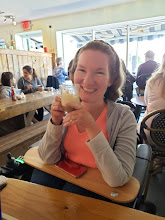The past few posts are some thoughts I've had and insights I've gained over the past few years regarding ministry with international people. As you can read about, there are some special details to consider and be sensitive to as you seek to relate to people from other countries, other cultures, other world views. There are special ways to approach these relationships, and ways to train and equip yourself to respond well and have effective communication.
The same is true in any ministry you invest in. Youth workers know that each new generation of teens and pre-teens comes with its own unique basket of issues that need to be researched, studied, and committed to prayer. People who serve in disability ministry develop a heightened sense of awareness when it comes to physical and social accessibility and care. Those who choose to live in community with people in poverty learn a different perspective on money, opportunity, and social justice. You may be in prison ministry, college ministry, gang ministry, or pre-school ministry. Wherever you are, whatever your "niche" is, there are special realities, special dialects, special approaches to building bridges with the people who you want to love and serve for Christ's sake.
But here's something I've realized: Wherever you serve, people are people, and at our core (where it matters most), we are all the same. We all desire dignity, purpose, and to know that we are loved unconditionally. We should treat every human life as valuable, and we should seek to learn and understand beyond our own assumptions and agendas.
Consider Jesus' ministry. He connected with people who were poor and rich, young and old, the outcasts and the in-crowd, wise and foolish, religious and criminal, men and women, foreigners and hometown boys, the sick, the disabled, even the dead. He didn't have a "niche" - he just saw people as people who were starving for hope and thirsty for life.
Now, he didn't ignore their distinctions; he addressed them directly, and on more than one occasion waited for the person to own up to it themselves (consider the bleeding woman, the Samaritan woman, the blind man, etc.), because what made them different DID matter. It mattered where and how the bridges were built. He never rejected the opportunity to connect with someone, but he wouldn't put mud on the eyes of the paralyzed man on the stretcher, or tell the poor widow to go away and sell all she had!
But in every single situation, a custom-made bridge was built, and wherever the bridge began, it ended at the same place: Jesus met the person where they were, and led them to the Father.
So build bridges. Seek to understand, humble your attitude, find a common ground, extend a hand of true compassion, wash some dusty feet. And continue to walk along that bridge in the direction of the God who loves us all - who made us all special, and yet the same.
Thursday, April 2, 2015
Subscribe to:
Comments (Atom)




